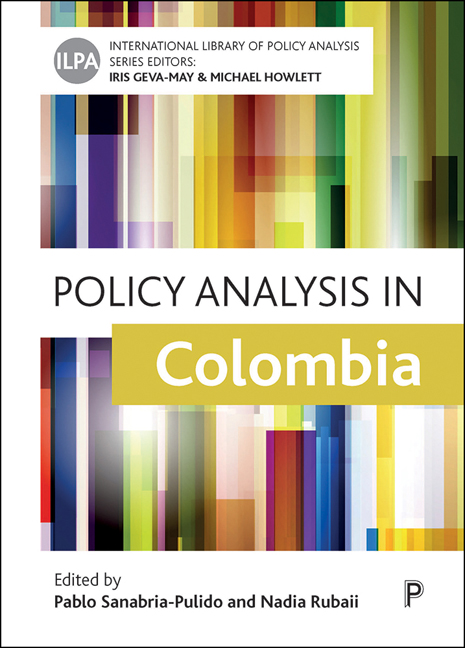Book contents
- Frontmatter
- Dedication
- Contents
- List of Figures and Tables
- List of Abbreviations
- Notes on Contributors
- Editors’ Introduction to the Series
- Policy Analysis in Colombia: An Introduction
- Part One Policy Analysis in Contemporary Colombia
- One The policy Analysis Movement in Colombia: The State of the Art
- Two Evolution of Policy Analysis as a Field of Study and Instruction in Colombia
- Three Policy Analysis, Bureaucratic Capacity and Public Administration Reforms in Colombia
- Part Two Policy Analysis within National and Subnational Governments
- Four Policy Analysis Inside Central Government in Colombia
- Five Policy Analysis and the Legislature in Colombia
- Six Policy Analysis in the Colombian Constitutional Court
- Seven Metropolitan Governance and Policy Analysis in Colombia
- Eight Policy Analysis for Decision Making in Colombian Local Governments
- Part Three Policy Analysis in Key Policy Domains
- Nine Policy Analysis in the Education Sector in Colombia
- Ten Policy Analysis in the Health Sector in Colombia
- Eleven Policy Analysis and Decision Making in the Military Forces: The Havana Experience
- Twelve Technocracy, Decision Making and Economic Policy in Colombia
- Thirteen Social Policy, Target Populations and Policy Analysis in Colombia
- Part Four Policy Analysis Beyond the State
- Fourteen Political Parties and Policy Analysis in Colombia
- Fifteen Policy Analysis and NGOs in Colombia
- Sixteen Media, Evidence and Policy Analysis in Colombia
- Conclusion: Building Capacity for Policy Analysis Amid Tensions and Challenges in Colombia
- Index
Two - Evolution of Policy Analysis as a Field of Study and Instruction in Colombia
Published online by Cambridge University Press: 10 March 2021
- Frontmatter
- Dedication
- Contents
- List of Figures and Tables
- List of Abbreviations
- Notes on Contributors
- Editors’ Introduction to the Series
- Policy Analysis in Colombia: An Introduction
- Part One Policy Analysis in Contemporary Colombia
- One The policy Analysis Movement in Colombia: The State of the Art
- Two Evolution of Policy Analysis as a Field of Study and Instruction in Colombia
- Three Policy Analysis, Bureaucratic Capacity and Public Administration Reforms in Colombia
- Part Two Policy Analysis within National and Subnational Governments
- Four Policy Analysis Inside Central Government in Colombia
- Five Policy Analysis and the Legislature in Colombia
- Six Policy Analysis in the Colombian Constitutional Court
- Seven Metropolitan Governance and Policy Analysis in Colombia
- Eight Policy Analysis for Decision Making in Colombian Local Governments
- Part Three Policy Analysis in Key Policy Domains
- Nine Policy Analysis in the Education Sector in Colombia
- Ten Policy Analysis in the Health Sector in Colombia
- Eleven Policy Analysis and Decision Making in the Military Forces: The Havana Experience
- Twelve Technocracy, Decision Making and Economic Policy in Colombia
- Thirteen Social Policy, Target Populations and Policy Analysis in Colombia
- Part Four Policy Analysis Beyond the State
- Fourteen Political Parties and Policy Analysis in Colombia
- Fifteen Policy Analysis and NGOs in Colombia
- Sixteen Media, Evidence and Policy Analysis in Colombia
- Conclusion: Building Capacity for Policy Analysis Amid Tensions and Challenges in Colombia
- Index
Summary
Introduction
The primary purpose of this chapter is to provide a descriptive overview of the evolution and current status of public policy education, broadly defined, as a professional field of study in Colombia. In doing so, it will be clear that the study of public policy, and more specifically of evidence-based policy analysis, is a very new undertaking in Colombia. A secondary objective of this chapter is to provide some context for understanding the discussions that follow in subsequent chapters regarding the roles of specific governmental and nongovernmental actors in policy analysis, and the application of policy analysis within various policy realms. To the extent that educational offerings in policy analysis for practicing and aspiring public service professionals are only recently available, the limited application of rigorous analysis in various contexts can be better understood.
Public policy education in Colombia is delivered within the context of a larger system of higher education that both facilitates and constrains its development. The first part of this chapter provides some context for understanding the system of higher education in Colombia in terms of both its institutional structure and the mechanisms for ensuring quality. In the second section, we document the development of public policy programs, placing this discussion in the context of the similarly young field of political science within Colombia. We organize the discussion by level of education to provide an overview of the status of both undergraduate and graduate programs. The most detailed discussion is with respect to Master's programs, with attention to the types of degrees offered, their institutional, disciplinary and geographic loci, and their curriculum content. The final section of the chapter reflects on the status of Colombian public policy education and its capacity to contribute to improved quality of public administration.
The Colombian higher education context
As of 2017, the most recent year for which data are reported, Colombia's higher education system consists of 292 institutions (MEN, 2018). Colombia categorizes these as falling into one of four categories: universities (n=85), technology schools and university institutes (128), technology institutes (49) and professional technical institutes (30). Each category may include both public and private institutions.
- Type
- Chapter
- Information
- Policy Analysis in Colombia , pp. 31 - 46Publisher: Bristol University PressPrint publication year: 2020



